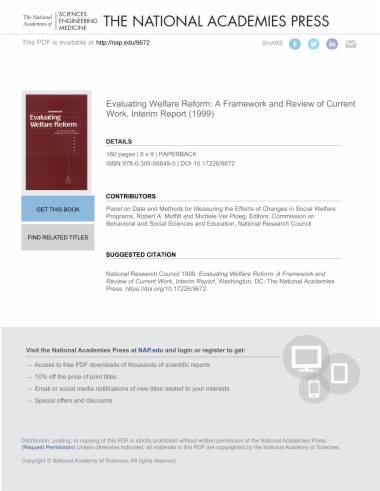

The Personal Responsibility and Work Opportunity Reconciliation Act (PRWORA) of 1996 fundamentally changed the nation's social welfare system, replacing a federal entitlement program for low-income families, called Aid to Families with Dependent Children (AFDC), with state-administered block grants, the Temporary Assistance for Needy Families (TANF) program. PRWORA furthered a trend started earlier in the decade under so called "waiver" programs-state experiments with different types of AFDC rules-toward devolution of design and control of social welfare programs from the federal government to the states. The legislation imposed several new, major requirements on state use of federal welfare funds but otherwise freed states to reconfigure their programs as they want. The underlying goal of the legislation is to decrease dependence on welfare and increase the self-sufficiency of poor families in the United States.
In summer 1998, the Office of the Assistant Secretary for Planning and Evaluation (ASPE) of the Department of Health and Human Services (DHHS) asked the Committee on National Statistics of the National Research Council to convene a Panel on Data and Methods for Measuring the Effects of Changes in Social Welfare Programs. The panel's overall charge is to study and make recommendations on the best strategies for evaluating the effects of PRWORA and other welfare reforms and to make recommendations on data needs for conducting useful evaluations. This interim report presents the panel's initial conclusions and recommendations. Given the short length of time the panel has been in existence, this report necessarily treats many issues in much less depth than they will be treated in the final report. The report has an immediate short-run goal of providing DHHS-ASPE with recommendations regarding some of its current projects, particularly those recently funded to study "welfare leavers"-former welfare recipients who have left the welfare rolls as part of the recent decline in welfare caseloads.